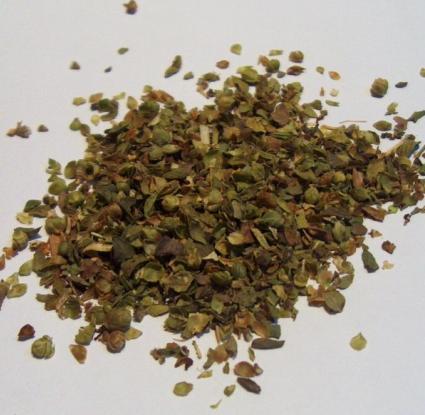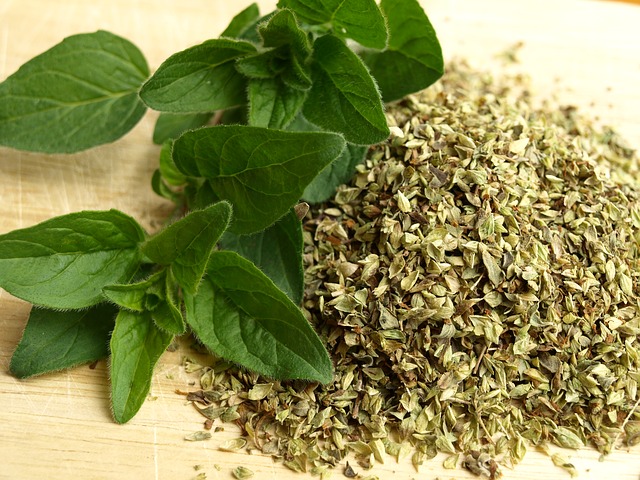Rigani is used as a typical seasoning of the Mediterranean cuisine due to its intense flavour and aroma.
Name - Origin
Rígani (oregano) is a bushy aromatic plant, cultivated for its leaves (and flowers), which when dried are used as a typical seasoning of Mediterranean cuisine due to their intense flavour and aroma (Babiniotis 2005, entry ρίγανη,η, 1545).
ETYM. < original origanos, origanon (with silencing of the initial atonal o- and change of gender) (Babiniotis 2005, entry ρίγανη,η, 1545; Yangoullis 2014, entry ρούβανος,ο - ρίανον,το, 466) without genitive plural (Babiniotis 2005, entry ρίγανη,η, 1545)
When someone says ‘váltou rígani’ (put oregano on it) it means that he spoiled the food and wants to cover it up. The same means for a case/matter that went to waste (Petrou-Poeitou 2013, entry Oregano, 126).
Additional information and bibliography
Oregano is also widely used in pharmacy, mainly for the antispasmodic action of the oil produced from this plant (oregano oil) (Babiniotis 2005, entry ρίγανη,η, 1545). It is used for pains in the back, knees, elbows, spoons, joints, etc. (Yagoullis 2014, article ruanos - rowanos,o - rrianon,to, 466). George Sofokleous in the second volume of his publication «Παράθυρο στην Κύπρο μας: λαογραφική–πολιτιστική ανθολογία» (window to our Cyprus: folklore-cultural anthology) notes the properties of oregano: “ ...for back pains, knee, kidney, elbow arm and joint pain..." the older generation used oregano oil for external rubbing on the problem areas of the body. The affected person had to either resort to a ‘special’ practitioner or make the recipe himself, if he had the necessary knowledge. In order to make oregano oil, one had to collect oregano during the summer months, preferably in July and August. Oregano is scattered all over the island and are easy to find. So when the oregano was ripe, they collected the flowers and leaves and put them in a small pot with water and boiled them. Then, they poured the boiled liquid into a a clay vessel (a metal container later) with two spouted outlets. One up high, to let the oil out, and the other down low, to let the water out. In this way they got the oregano oil. They stored it away cautiously and used it for rubbings to relieve bodily pains. They would apply it with a chicken feather to the part of the body that had the problem carefully as the oil was very strong and stung. If they applied more than they should, there was an appropriate antidote: rub the body part at once with olive oil” (Sophocleous 2004, 136-137).
Yangoullis K. G. (2014), Θησαυρός της Μεσαιωνικής και Νεότερης Κυπριακής Διαλέκτου. Ερμηνευτικός, Ετυμολογικός, Φρασεολογικός και Ονοματολογικός, Βιβλιοθήκη Κυπρίων Λαϊκών Ποιητών,74,
Babiniotis G. (2005), Λεξικό της Νέας Ελληνικής Γλώσσας. Με σχόλια για τη σωστή χρήση των λέξεων. Ερμηνευτικό, Ορθογραφικό, Ετυμολογικό, Συνωνύμων-Αντιθέτων, Κυρίων Ονομάτων, Επιστημονικών Όρων, Ακρωνυμίων, Centre for Lexicology, Athens, Greece.
Petrou-Poeitou E. (2013), Από πού κρατάει η σκούφια τους. Λέξεις και ιστορίες από τον κόσμο της γεύσης, Epiphaniou Publications, Nicosia.
Sophocleous G. (2002-2006), Παράθυρο στην Κύπρο μας: λαογραφική–πολιτιστική ανθολογία, τ. Β΄, MAGS Press, Larnaca.
Tonia Ioakim, Stalo Lazarou, Argyro Xenophontos


